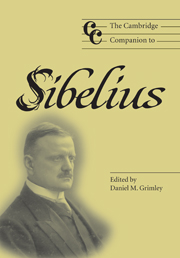Book contents
- Frontmatter
- Introduction
- Part I Forging a voice: perspectives on Sibelius's biography
- Part II Musical works
- 3 Pastoral idylls, erotic anxieties and heroic subjectivities in Sibelius's Lemminkäinen and the Maidens of the Island and first two symphonies
- 4 The later symphonies
- 5 The genesis of the Violin Concerto
- 6 Finlandia awakens
- 7 The tone poems: genre, landscape and structural perspective
- 8 Finnish modern: love, sex and style in Sibelius's songs
- 9 Sibelius and the miniature
- Part III Influence and reception
- Part IV Interpreting Sibelius
- Notes
- Select bibliography
- Index of names and works
5 - The genesis of the Violin Concerto
from Part II - Musical works
Published online by Cambridge University Press: 28 September 2011
- Frontmatter
- Introduction
- Part I Forging a voice: perspectives on Sibelius's biography
- Part II Musical works
- 3 Pastoral idylls, erotic anxieties and heroic subjectivities in Sibelius's Lemminkäinen and the Maidens of the Island and first two symphonies
- 4 The later symphonies
- 5 The genesis of the Violin Concerto
- 6 Finlandia awakens
- 7 The tone poems: genre, landscape and structural perspective
- 8 Finnish modern: love, sex and style in Sibelius's songs
- 9 Sibelius and the miniature
- Part III Influence and reception
- Part IV Interpreting Sibelius
- Notes
- Select bibliography
- Index of names and works
Summary
A week before Sibelius first mentioned the Violin Concerto, his thoughts returned to his youthful dream of becoming a violin virtuoso:
I try to work but have not succeeded in shaping the routine in a way that would please me, that is now my main goal. More at the writing-table – less with the piano. Yet, I once wanted to become a violin virtuoso, and this ‘performing’ element always takes such strange forms within me. Tinkling on the piano and partying. It all comes from the same root. That's quite clear to me now.
Becoming a violin virtuoso had been Sibelius's first priority ever since he started to study the instrument in the autumn of 1881 at the age of fifteen. ‘When I play [the violin], I am filled with a strange feeling; it is as though the insides of the music opened up to me’, he wrote two years later. Along with violin playing he had also started to compose, and year by year his compositional activity increased. During his early years, however, composing was not given first place.
Barely a year before the completion of Kullervo, Sibelius still planned public appearances as a violinist: ‘I play the violin every day. I think I should perform in Helsinki some time in the coming year,’ he wrote to his fiancée Aino from Vienna. He also auditioned for the Vienna Philharmonic Orchestra, but the result was not what he had hoped for: the jury regarded his playing as ‘not at all bad’, but nevertheless recommended him against playing the violin because of his nerves.
- Type
- Chapter
- Information
- The Cambridge Companion to Sibelius , pp. 66 - 80Publisher: Cambridge University PressPrint publication year: 2004
- 2
- Cited by

